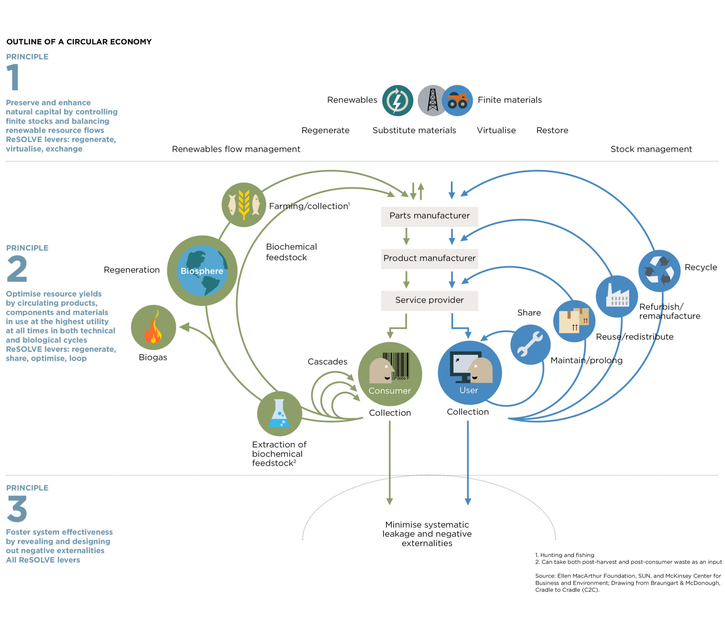Circular Economy Contest Put in Motion at Davos 2019
The contest invites social entrepreneurs to submit revenue-generating ideas that use data analytics and machine learning to advance a circular economy.
A sustainable future requires people and businesses to rethink their present reality. Between agriculture, energy, pollution and consumption, people are using more resources than can be regenerated. With innovation at the forefront of economic growth, technology companies and entrepreneurs are thinking more about sustainability.
This line of thinking from Mountain View, Calif.-based Google Cloud has sparked the Circular Economy 2030 competition. In partnership with SAP, the Ellen MacArthur Foundation, UN Environment, World Wildlife Fund (WWF) and the Global Partnership for Sustainable Development Data, the contest was launched last week at Davos 2019 World Economic Forum in Davos, Switzerland.
“We hope this competition will uncover ideas that impact any aspect of the global economy, from eco-friendly packaging solutions to sustainable agriculture,” says Alison Wagonfeld, chief marketing officer for Google Cloud.
The contest invites social entrepreneurs to submit revenue-generating ideas that use data analytics and machine learning to advance a circular economy.
“A circular economy seeks to rebuild capital, whether this is financial, manufactured, human, social or natural,” says Wagonfeld. “It’s the kind of economy that could help generate $4.5 trillion of new economic output by 2030.”

Five finalists will be selected and announced at the Google Cloud Next conference in San Francisco in April. They also will participate in an in-person hackathon for the opportunity to win more than $200,000 of in-kind benefits, plus participation in Google Cloud for Startups’ Bootcamp. The remaining four finalists will each receive $45,000 in in-kind benefits, plus one-on-one mentorship.
During the hackathon, finalists will be asked to further develop their idea through a well-researched business plan and present an illustrative demonstration of how they are using Google Cloud and SAP solutions to make that idea a reality.
“We are looking for submissions from social entrepreneurs, such as an owner or a leader of a social enterprise, someone who's looking to jump-start their idea or even members of nonprofits or community-based organizations,” says Alicia Tillman, chief marketing officer of SAP headquartered in Walldorf, Germany, with offices in the U.S. “Specifically, the submissions should explore ideas that support innovative business solutions that decouple economic growth from resource use, allowing for circular, regenerative systems.”
Contestants can apply through March 17 by visiting the Circular Economy 2030 website.
Google Cloud is an enterprise cloud platform that helps customers modernize their cloud computing environment and enter the modern digital world across Google Cloud Platform and G Suite. In 2015, Google set the goal to incorporate circular economy principles into its infrastructure operations, products and culture.
“Since then, we've worked to integrate this approach into how we manage our servers in our data centers and the materials we select to build and furnish our offices,” says Wagonfeld. “We’re also exploring the role of technology in advancing the circular economy.”
The Google Sustainability team recently published a whitepaper with the Ellen MacArthur Foundation and McKinsey that looks at how artificial intelligence (AI) could be applied to create a regenerative, circular economy at scale.
From back office to boardroom, warehouse to storefront, desktop to mobile device, SAP aims to help simplify technology for companies of all sizes. SAP has partnerships and programs that help businesses achieve a more sustainable future and support the UN Sustainable Development Goals.
“Around circular economy in particular, the SAP Leonardo Plastics Challenge pulled together dozens of companies from throughout the value chain to collaborate on consumer solutions to this global challenge,” says Tillman. “SAP also works with the World Economic Forum around digital supply chain, which has a huge role to play in moving toward a zero waste economy, especially in the areas of 3-D printing and shared business networks using blockchain and Internet of Things technology, which allow manufacturers and suppliers to collaborate in real time.”
According to Wagonfeld, modern technology can empower organizations to build a better future.
“From building more sustainable data centers to changing the way data is processed and developed, to the role of AI in achieving a circular economy, technology will be pivotal in moving our society toward a more sustainable future,” she says.
Tillman says that SAP believes technology can help countries, private and public sector organizations and everyday citizens control risk, achieve regulatory compliance, use resources efficiently and innovate new business models in the digital economy.
“At SAP, we believe it is our duty to put our technology to use to help the world run better and improve people’s lives,” she says. “We have many purpose-driven initiatives. In particular, we embrace the challenge of environmental responsibility.”
About the Author
You May Also Like


.png?width=300&auto=webp&quality=80&disable=upscale)